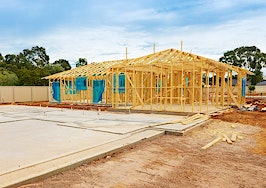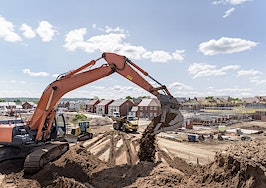To the surprise of some, the multifamily real estate sector came through the worst of the pandemic with flying colors. Occupancy rates reached a record high of 97.1 percent in August 2021. Rents rose 20 percent over an eight-month period ending in April 2022. And the forecast for the months ahead is no less promising.
Danushka Nannayakkara-Skillington, assistant vice president for forecasting and analysis for the National Association of Home Builders (NAHB), recently said that year-over-year growth in the sector is expected to be 6 percent and that as many as 500,000 multifamily units will be built in the U.S. this year.
All of that reflects the sector’s strong fundamentals, as well as the ability of multifamily leaders to adapt while supply chain issues affected the industry, in much the same way they impacted other sectors — if not more.
As I well know in my position as founder and managing principal for a private equity real estate firm focused on the multifamily space, lumber has been in short supply. So too have copper, aluminum, HVAC units and water heaters.
A perfect storm
Roger L. Bowman, vice president of merchandising and replenishment at the Phoenix-based multifamily supplier AZ Partsmaster, called it “the perfect storm“ and added, “I’ve been doing this a long time, and neither I nor folks I know in the industry have ever seen anything like what we’re dealing with today.”
Same for me, and I’ve been in real estate since 1979. In addition to virus-related slowdowns and shutdowns, natural disasters like a Louisiana hurricane and a Texas winter storm impacted various industries. There were backlogs at ports in Los Angeles and Long Beach, and even delays resulting from an unlikely traffic jam in the Suez Canal after a container ship ran aground in March.
And never to be forgotten, either, are climate change-related issues. Cityview CEO Sean Burton and vice president of development Adam Perry have “incorporated a climate risk assessment” in their underwriting process, which enables them to “explore a variety of mitigation measures that could include altering the building design, utilizing certain building materials, or designing landscaping in a particular manner.”
The pandemic alone led to construction delays of up to six months and spiraling costs, according to some reports. The cost of materials alone rose between 18 percent and 20 percent, and overall costs spiked by as much as 40 percent.
Although I didn’t see those extremes, certainly there were double-digit increases, and I would add that the delays were due not just to supply chain issues but also hold-ups in the processes required to obtain entitlements, permits and the like, since governmental bodies, like private entities, were affected by manpower shortages.
The biggest contributor to rising construction prices was a spike in the price of lumber, the single most important commodity for any of us in the business. In some cases, mill closures resulted in the price for framing board lumber rising a staggering 228 percent from April 2020 to April 2021.
It has moderated since then, but NAHB statistics say that has increased the cost per apartment unit by $7,300. That calculates to another $67 a month for the average renter.
There simply is no way around that. There is no synthetic substitute for lumber, no other material that will serve as studs, door frames or the doors themselves for that matter.
Work with manufacturers and vendors
Multifamily leaders have, however, taken steps to ease the sting of supply chain issues. For one thing, they have solidified their relationships with manufacturers and vendors. They understand that “working directly with the manufacturer or the source of the product in some trades simplifies communication and streamlines the entire process,” according to Michael Brooks, vice president of procurement for Alliance Residential Company.
Jennifer Lester, director of Vendor Management for RealPage, noted that it is “more important now than ever to have a good relationship with your vendor partners,” because vendors are “taking care of their established customers to ensure they have what they need to keep their communities maintained.”
Plan ahead
The other key to weathering the storm is advance planning — laying the groundwork well before you might have done so in the past. Joseph DiSalvo, executive vice president of the New Jersey-based Michaels Construction, said that his company begins the planning process some 12-18 months before the construction phase, and certainly, that is the best way to get out in front of supply-chain snarls.
In fact, some of that even preceded the pandemic. We have typically done some of the framing of walls and dividers between units in a plant, then shipped them to the construction site. That is particularly valuable for those projects we have undertaken in Midwest and Eastern markets, where there are seasonality issues that curtail winter work.
Certainly, however, the value of doing advance work is even more apparent now than in the past. The pandemic has presented an unprecedented challenge, and multifamily leaders have been forced to adapt. The challenge is ongoing, but in the main, the sector continues to thrive.
Michael H. Zaransky is the founder and managing principal of MZ Capital Partners in Northbrook, Illinois. Founded in 2005, the company deals in multifamily properties.













